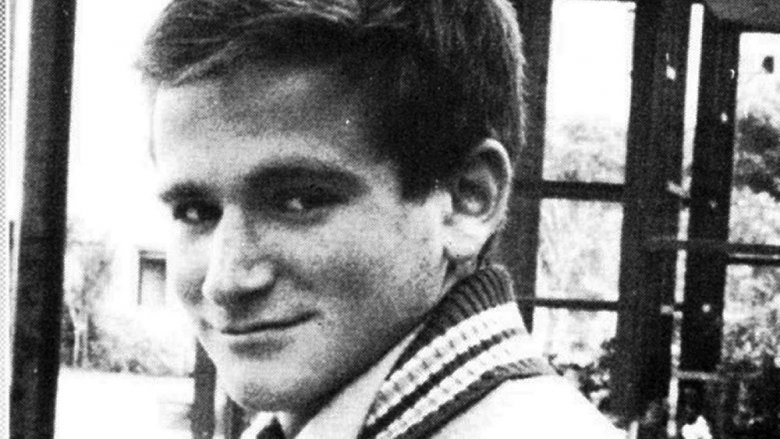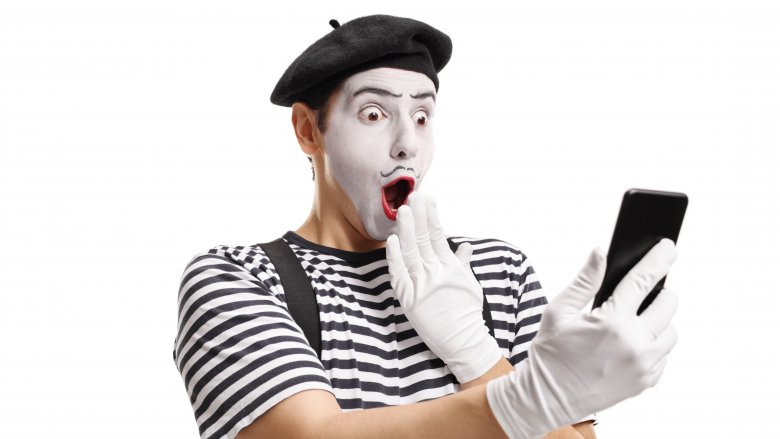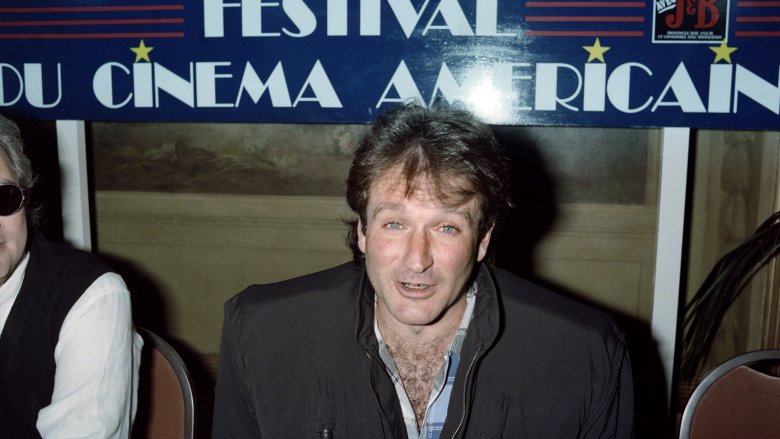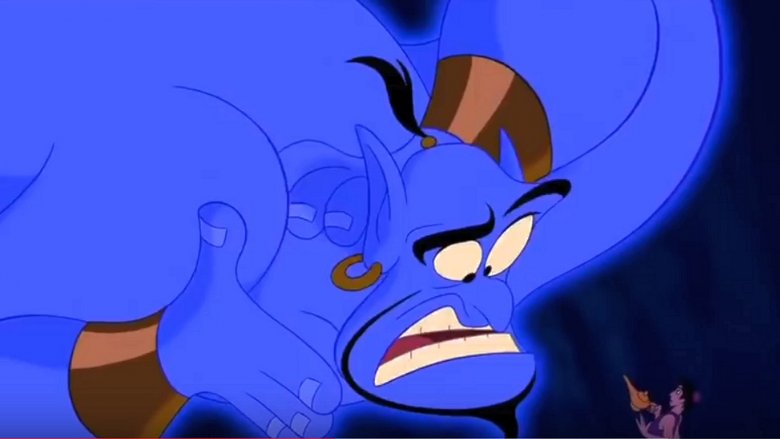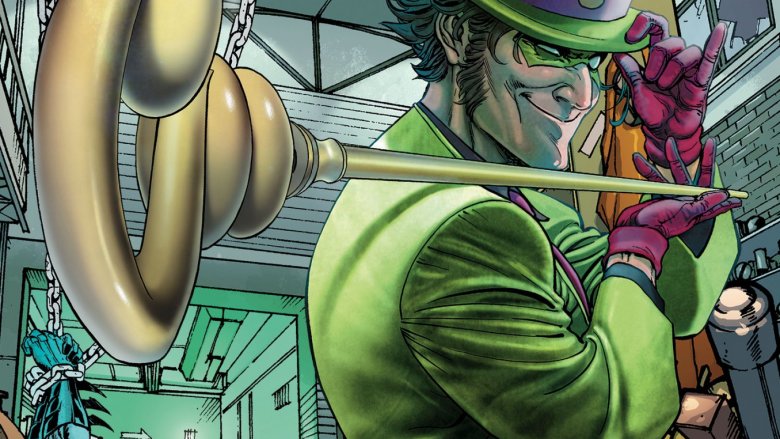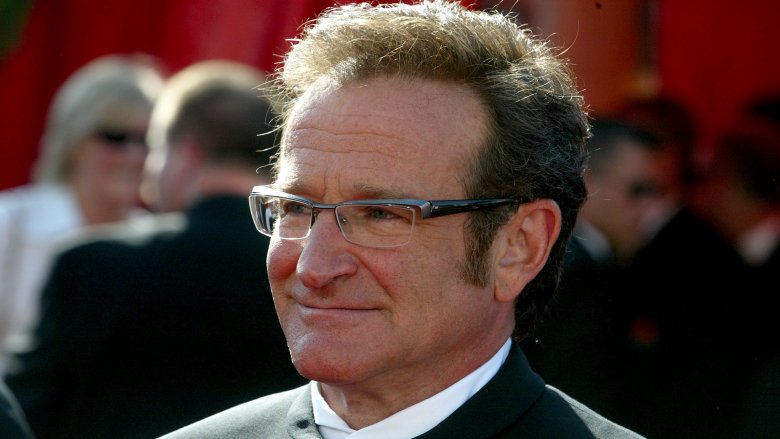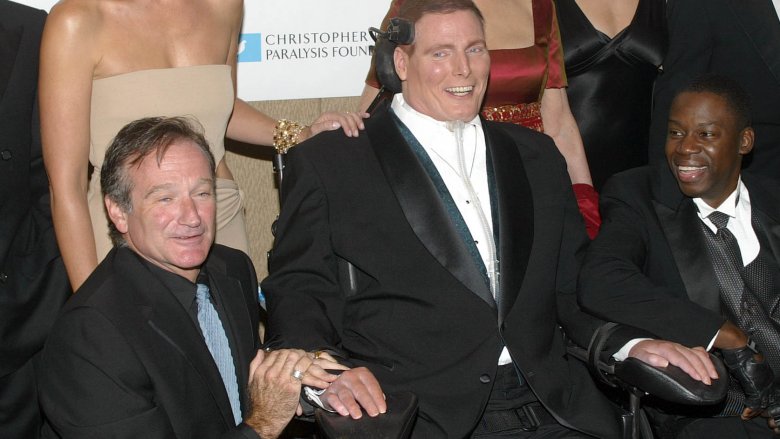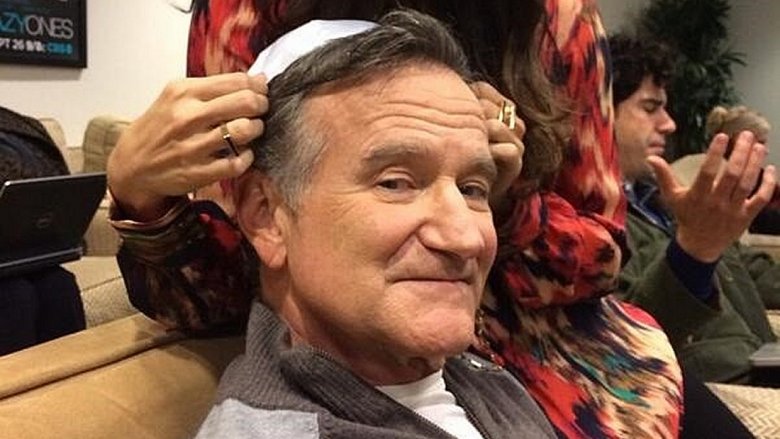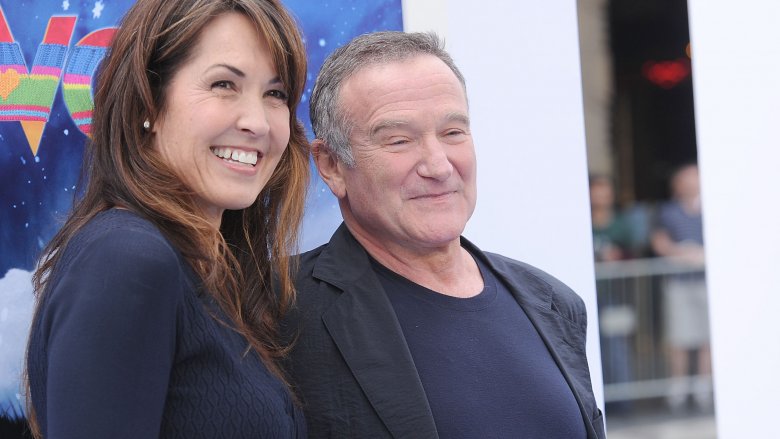The Untold Truth Of Robin Williams
You'd be hard-pressed to find any celebrity more beloved than Robin Williams, the guy who could switch from irreverent radio DJ to cross-dressing single dad to ancient genie in the blink of an eye. No matter what role he played, Williams was always genuine, always heartfelt, and always memorable. When he died, the entire world mourned the loss, with The Verge reporting that a tunnel in San Francisco was renamed in his honor, and then-U.S. President Barack Obama commenting that Williams was "one of a kind," according to the Huffington Post. However, despite being one of the most prominent public figures of the 20th century, Williams was a man of many hidden layers, who possessed strong beliefs and an immense passion for his chosen art form.
He was shy and quiet as a kid
When one remembers the genius comedy of Robin Williams, the first thing that comes to mind is his manic intensity. Whether on stage or in front of a camera, Williams could clip along at lightspeed, his hilarious, bold, bombastic stream of consciousness forcing even the most hardened cynic to crack a smile. But in his earlier years, Williams wasn't the rambunctious class clown you might expect. Instead, he was a self-conscious, quiet, driven kid with a lot of self-doubt. According to PsychCentral, Williams described his childhood self as being "short, shy, chubby, and lonely." He spent his early years playing by himself in his family's giant house, since his upper-class parents were usually busy with other matters. Williams often claimed that his famous sense of humor first developed as a way to get his mother's attention by making her laugh. As written by Education World, Williams also learned that he could use comedy to "bridge the gap" between himself and other students, and as a self-defense mechanism for dealing with bullies.
All through high school, Williams was a hardworking, straight-A student. According to Encyclopedia Britannica, he initially went into college aiming for a degree in political science, until his decision to take improv classes took him in a radically different direction.
He once worked as a mime in New York
Here's a reason to never throw out your old photographs: You might be holding a piece of history. In 1974, according to PetaPixel, a photographer named Daniel Sorine was walking through New York's Central Park when he happened to photograph two mimes, whom he described as having "an unusual amount of intensity, personality, and physical fluidity." Almost four decades later, Sorine dug up the old photos and was startled to realize that one of the mimes was a young Robin Williams, well before stardom.
This was in Williams' early days, shortly after the acting bug had first bitten him. Williams was living in New York City in those years because his passion for acting had earned him a scholarship at Juilliard, according to Encyclopedia Britannica. Though Williams' unbeatable energy earned the acclaim of his classmates, including future Superman actor Christopher Reeve, the LA Times reported the school itself wasn't sure what to make of him. After the brief mime career Daniel Sorine so artfully captured, as well as a few improv attempts in local clubs, Williams decided to fly home to San Francisco.
In the 1970s, he went from bartender to stand-up comic to TV star
It was in San Francisco that Robin Williams' comedy career truly blossomed, according to a 1988 issue of Rolling Stone. After arriving back on the West Coast, he started working as a bartender at a small comedy club called the Holy City Zoo. At some point, someone must have realized the guy mixing everybody's cocktails was even funnier than the people on stage, so Williams started doing stand-up for the same club.
According to Maclean's, the young comic then took his act down to Los Angeles, where he gained enough positive word-of-mouth to book a couple minor TV appearances. Finally, his big break came crashing in when the popular sitcom Happy Days decided to do an episode in which the Fonz battled against a space alien named "Mork." Williams got the job, and while the Happy Days episode was only supposed to be a silly one-off, Williams' performance earned such raves that his alien character was spun off into his own TV series, Mork and Mindy, which became a network sensation — and made Robin Williams a household name.
Good Morning, Vietnam! made him a movie star
It wasn't long before Williams made the jump to the big screen, but it took a while for him to find a role that properly suited his high-energy, heartfelt style. His cinematic debut had him starring as the classic cartoon character Popeye, according to Maclean's, followed by The World According to Garp, but neither of these films really grabbed mainstream audiences. Williams finally found the role he was looking for in 1987, according to Rolling Stone, when he blew filmgoers away as military DJ Adrian Cronauer in Good Morning, Vietnam!, a film that worked his dramatic chops and gave him free reign to go off on those improvisational comedic tangents everyone loved.
From there, Williams built his career on now-classic films like Dead Poet's Society, Mrs. Doubtfire, and The Fisher King. Unlike so many of his comic contemporaries, Williams wasn't interested in zany comedy flicks, and instead carved a niche for himself with dramatic, emotional, often tragic roles that still incorporated his rapid-fire jokes. He also earned a string of Academy Award nominations, finally winning in 1997 for his role as a psychologist in Good Will Hunting.
He almost didn't play Genie, even though the character was based on him
If the role of the big blue genie in Disney's Aladdin seems like it was tailor-made for Williams, that's because it was. Sure, Aladdin is based on ancient Middle Eastern folktales, but when Disney's creative team adapted the story to film, they created the Genie character with Williams in mind, according to the LA Times. An early test reel of Genie's animation was even synchronized to one of Williams' stand-up routines.
Despite this, the world was almost deprived of seeing Williams' brilliant Genie performance, according to the Washington Post, because Williams himself wasn't a fan of Disney's mass commercialism. When the Aladdin script was first mailed to him, he sent it back — unread. After a lot of negotiation, Williams agreed to star on the condition that his voice and image would not be used as part of a money-making machine to sell cross-promotional items — you know, Burger King toys, T-shirts, that sort of thing.
Unfortunately, when Disney realized how amazing the actor's performance was, they went back on their word, and marketed Williams anyway. Williams was furious at the betrayal of trust, and he had a massive falling-out with Disney, which wasn't solved when the studio tried to bribe him with a $1 million dollar Picasso painting. This feud lasted a couple years, but both parties finally made up their differences in 1994, when Disney studio head Joe Roth apologized for how badly they had treated Williams.
He really wanted to get into a Batman movie, but got 'jilted' twice
Fans would've loved to have seen Robin Williams snag a role in a Batman movie, but perhaps no one wanted to get into the series more than the man himself. As reported by Syfy, Williams got within inches of being a Batman villain two times, only to get stood up. The first snub happened in 1989, when WB's top pick for the Joker, Jack Nicholson, was wavering on the deal. The studio then approached Williams to play Batman's archenemy, but before Williams got his chance, Jack swept back in and reclaimed the role. Bizarrely enough, this exact scenario happened again in 1995, when Williams was slated to play the Riddler in Batman Forever, only for the studio to give the role to Jim Carrey instead.
Despite all this snubbing, according to A.V. Club, Williams was still down for playing a Batman villain by the time Christopher Nolan took over the franchise, stating he'd "do anything" to get into the new Dark Knight trilogy, even if he could just cameo as an inmate in Arkham Asylum. Back in 2011, it was rumored that Williams might appear in The Dark Knight Rises as the villainous psychiatrist Dr. Hugo Strange, according to Screen Rant, but there's no evidence this theory was anything other than internet gossip.
He struggled with addiction
The story of Robin Williams can't be told without also documenting his lifelong battle with addiction. Williams first slipped into binge-drinking and cocaine abuse during his time on Mork and Mindy, right as his star was on the rise, according to People. He dropped both substances in 1982, reportedly due to two major life events: one, his wife was pregnant with their son, and two, his comedian friend John Belushi had died of a drug overdose. According to ABC, Williams said it was a "wake-up call."
Williams was successfully sober for decades and never went back to cocaine. But sadly, on a lonely 2003 shoot in Alaska, he relapsed back into drinking, as he explained to The Guardian. He continued drinking for three years — a time he said wasn't remotely enjoyable while it lasted — before checking into rehab in 2006. From then on, Williams remained sober until the end of his life. According to Yahoo he did go to rehab again in 2014, but this was reportedly because he wanted to maintain his sobriety, not due to a relapse.
He was there for his friend, Christopher Reeve, in his moment of need
One of Robin Williams' closest friends was Superman actor Christopher Reeve. The two had stayed in contact ever since their Juilliard days, as both grew into worldwide icons. As we all know today, tragedy struck in 1995, when a horseback riding accident left Reeve quadriplegic. According to Today, Reeve's accident then necessitated a risky medical procedure to reattach his skull and spine.
Scared, heartbroken, and still reeling from the accident, Reeve and his family grimly readied themselves for the procedure — when out of nowhere, according to Esquire, Williams burst into the hospital room dressed as a doctor, claiming in an exaggerated Russian accent that he was a proctologist and that he was going to have to give Reeve an examination. It's been said that, following the accident, this instance was the first time Reeve truly laughed. Reeve himself once stated, "My old friend had helped me know that somehow I was going to be okay.'" The two actors remained close until Reeve's death in 2004, and when Williams himself died 10 years later, the loss was publicly mourned by the Reeve family.
He was an 'honorary Jew'
Okay, so Robin Williams wasn't officially Jewish. He was raised Episcopalian, and as an adult, he never fully clarified what his religious views were. However, there's no doubt he possessed an immense love for Jewish culture, according to Jewish newspaper The Forward, with many of his comedy routines involving Yiddish phrases, dancing the hora, bar mitzvahs, and references to Fiddler on the Roof. He played many Jewish characters throughout his career, including rabbis, an elderly Jewish lady, and most notably in 1999, where he starred in Peter Kassovitz's Holocaust-themed film Jakob the Liar, as a Jewish shopkeeper living in 1944 Poland.
Because of William's well-documented affinity for Jewish culture, Israeli newspapers the Jerusalem Post and the Times of Israel both mourned the actor's death, proclaiming him an "honorary member of the tribe." Williams would have been pleased; he had often referred to himself as "an honorary Jew" for many years prior.
In the end, he was hit by a sudden case of Lewy body dementia
It has often been stated that Robin Williams' heartbreaking suicide by hanging was caused by the actor's battle with depression, but the truth is much more complicated. According to Scientific American, the true story is that Williams was (incorrectly) diagnosed with Parkinson's disease, and his dementia symptoms progressed rapidly. In the last few months of his life, his cognitive abilities declined so quickly that he was unable to remember his lines on the set and was overcome with paranoia, insomnia, a loss of sensory functions, and panic attacks.
After his death, the autopsy revealed that Williams had been misdiagnosed, and had actually suffered from the onset of Lewy body dementia, a disease that impacts an estimated 1.3 million Americans. Williams' wife, Susan, referred to the disease as the "terrorist inside my husband's brain," and she said the last year of his life was a painful flurry of ineffective medical trials, physical therapy, alternative treatments like yoga and meditation, as well as anything Williams could do to try to help his brain regain its prior functions. Tragically, there's no known cure for Lewy body dementia, and the escalation of this disease led to the tragic end of a man the world will always remember fondly, as one of the most celebrated and talented performers of his time.
